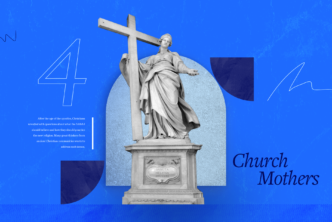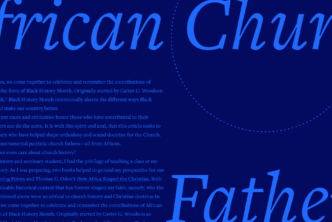Happy Thanksgiving from all of us at Faithlife! Enjoy this excerpt from the Lexham Bible Dictionary (included free in Logos) about the role of thanksgiving in the early church.
***
Thanksgiving played an important role in the life of the early church, whether in letters, worship, the Lord’s Supper, or private prayer.
In New Testament letters
Most of Paul’s letters contain a section of thanksgiving, typically after the formal greeting and address. . . . Paul offers thanks to God the Father, usually in regard to the faith of the specific church he is addressing (e.g., 1 Thess 1:2–10). His thanksgiving statements also serve to introduce the primary themes of his letters.
At Christian meals
The book of Acts and the New Testament letters mention thanksgiving in relation to Christian meals. For example, the book of Acts recounts that after enduring a storm at sea, Paul “took some bread and gave thanks to God in front of them all. Then he broke it and began to eat” (Acts 27:35 NIV). Paul also mentions thanksgiving in association with meals in his discussions of proper eating for Christians.
- In Romans 14, Paul addresses a division between those who feel they can eat anything and those who eat only vegetables (Rom 14:2). He clarifies that each was acceptable to God because “Whoever eats meat does so to the Lord, for they give thanks to God; and whoever abstains does so to the Lord and gives thanks to God” (Rom 14:6 NIV).
- In 1 Corinthians, Paul addresses whether Christians should eat meat that had previously been sacrificed to idols (1 Cor 10:25–28). After encouraging his audience to be sensitive so as not to offend another’s conscience (1 Cor 10:28–29), he states, “If I take part in the meal with thankfulness, why am I denounced because of something I thank God for?” (1 Cor 10:30 NIV).
- In 1 Timothy, Paul counters false teachers who forbid marriage and the eating of certain foods (1 Tim 4:3). He argues that God created all foods as good and they should be received with “thanksgiving by those who believe and who know the truth” (1 Tim 4:3–4 NIV). To Paul, “nothing is to be rejected if it is received with thanksgiving, because it is consecrated by the word of God and prayer” (1 Tim 4:4–5 NIV).
In communal worship
Thanksgiving seems to have been a regular part of the early church’s worship life (e.g., 1 Cor 14:16). Paul instructs the churches to give thanks to God for all things (Eph 5:20), which was part of God’s will for them (1 Thess 5:16–18). They were to be anxious about nothing, but instead to present their requests to God with thanksgiving (Phil 4:6). First Timothy 2:1–2 notes that as part of worship, Christians should offer petitions, intercessions, prayers, and thanksgiving for all people, including earthly rulers (1 Tim 2:1–2). News of the spreading of the gospel and generosity were to result in thanksgiving overflowing toward God (2 Cor 4:14–15; 9:11–12). In the visions of Revelation, the four living creatures (Rev 4:9), the angels (Rev 7:12), and the 24 elders (Rev 11:17) in the heavenly throne room provide a model for offering thanksgiving to God.
At the Lord’s Supper
Thanksgiving was likely an important part of the celebration of the Lord’s Supper. In 1 Corinthians, Paul indicates that “the cup of blessing” (εὐλογία, eulogia) was the cup for which they “offer a blessing” (εὐλογέω, eulogeō; 1 Cor 10:16). This followed the tradition of Jesus, who “gave thanks” before passing the bread and wine (1 Cor 11:24–25). Paul notes that he had received this tradition himself and subsequently handed it down to the Corinthian church (1 Cor 11:23).
. . .
In private prayer and life
. . . Thanksgiving is a characteristic of the entire Christian life (Guthrie, Theology as Thanksgiving, 181–216). Christians are to thank God for creating and sustaining the world and for his ongoing redemption of it through Jesus. They are expected to pray to God privately (Matt 5:6) and thank him for what he has done (Luke 17:12–19). The psalms display individual prayers of thanks (Psa 69:30–36), and the New Testament includes individual thanks for fellow believers (Phlm 1:4). Thanklessness is regarded as a rejection of God, which leads to further sin and eventual judgment (Rom 1:21).
Ultimately, Christians are to do all things in the name of the Lord Jesus, giving thanks to God the Father through him (Col 3:17). From this perspective, all of an individual’s life in Christ—whether in worship, at meals, or otherwise—becomes an opportunity to offer thanks.
***
This post is adapted from Lexham Bible Dictionary by John D. Barry, David Bomar, Derek r. Brown, et al.
Want to learn about the early church (or any era in church history)? See how you can do it with Logos.





